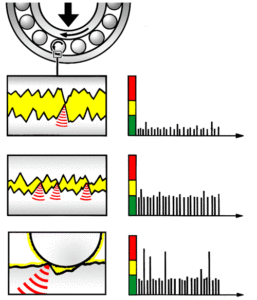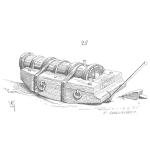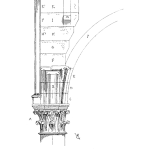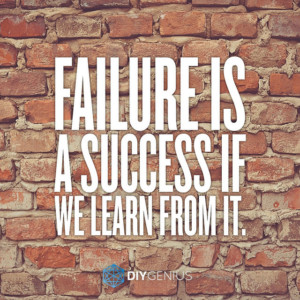How To Manage Each Failure Pattern With An Effective Maintenance Strategy
 Most maintenance and reliability professionals have seen the six failure patterns (or failure hazard plots), described by Nowlan and Heap. In case you are unfamiliar with them, you can learn more about them in a previous article on them. Here is a quick summary to jog the memory, just in case.
Most maintenance and reliability professionals have seen the six failure patterns (or failure hazard plots), described by Nowlan and Heap. In case you are unfamiliar with them, you can learn more about them in a previous article on them. Here is a quick summary to jog the memory, just in case.
- A. Bathtub Curve – accounts for approximately 4% of failures
- B. Wear Out – accounts for approximately 2% of failures
- C. Fatigue – accounts for approximately 5% of failures
- D. Initial Break-In – accounts for approximately 7% of failures
- E. Random – accounts for appoximately 14% of failures
- F. Infant Mortality – accounts for approximately 68% of failures
From the above, you can see that the majority of failures experenced are not directly related to age, but are the result of random or induced failures. So how does this help when establishing a maintenance program? First, we must understand what the patterns tell us.
What Types of Failure Modes Do The Failure Patterns Relate to?
Looking at the different failure patterns, we can group the types of failures into three unique groups;
- Age-Related failures – The term “life” is used to describe the point at which there is a rapid increase in the likelihood of failure. This is the point on the failure pattern before it curves up. Typically these types of failures can be contributed to wear, erosion, or corrosion and involve simple components that are in contact with the product.
- Random failures – The term “life” cannot be used to describe the point of rapid increase in the likelihood of failure, as there is no specific point. These are the flat parts of the failure curve. These types of failures occur due to some introduced defect
- Infant Mortality – The term “life” cannot be used here either. Instead, there is a distinct point at which the likelihood of failure drops dramatically and transitions to a random level.
Understanding these unique differences, an effective maintenance strategy can be developed.
What Maintenance Needs to Be Done for Each Failure Pattern?
The maintenance activity selected has to be right for the specific failure pattern. When looking at the failure patterns, there are three unique types of activities that can be put in place to address all points in the failure curve.
- Age-Related – These types of failures can be addressed through fixed time maintenance. Fixed time maintenance includes replacements, overhauls, and basic cleaning and lubrication. While cleaning and lubrication will not prevent the wear out or corrosion, it can extend the “life” of the equipment.
- Random – These types of failures need to be detected, as they are not predictable, or based on a defined “life.” The equipment must be monitored for specific indicators. These indicators may be changes in vibration, temperature, flow rates, etc. These types of failures must be monitored using Predictive or Condition monitoring equipment. Cleaning and basic lubrication can prevent the defects from occurring in the first place if done properly.
- Infant Mortality – These types of failures cannot necessarily be addressed through fixed time, predictive or condition-based maintenance programs. Instead, the failures must be prevented through proper design & installation, repeatable work procedures, proper specifications and quality assurance of parts.
Only when a maintenance program encompasses all of the above activities, can plant performance improve.
Determining the Right Frequency of Maintenance Activities for Each Failure Pattern
So with all of the activities taking place, how is it possible to know when each fixed time activity or condition monitoring inspection take place? The approach to determining the frequency of activities for fixed time and condition monitoring inspections are different. However, before the approaches are discussed, it should be noted that MTBF should NOT be used to determine the approach… EVER (sorry, the rant is over).
- Fixed Time Maintenance – The frequency for fixed time maintenance activities should be determined using a Weibull analysis. Also, there may be regulatory requirements which specify the frequency of these activities. This will provide an ideal frequency to perform these types of activities
- Condition Monitoring – The frequency for condition monitoring activities should be determined by using the P-F Curve and P-F Interval. This approach requires an understanding of the ability of monitoring technology, the defect being monitored, degradation rates, and the ability of the organization to react to the information gathered during the monitoring program. This will be furthered discussed in next weeks post.
I hope this has provided some clarity around how you should be using the six failure patterns in your maintenance strategy. Do you have specific activities in your program to address age-related, random and infant mortality failures? If you only have fixed time maintenance activities in your program, what are leaving on the table?
Remember, to find success; you must first solve the problem, then achieve the implementation of the solution, and finally sustain winning results.
I’m James Kovacevic
Eruditio, LLC
Where Education Meets Application
Follow @EruditioLLC
References;





 Imagine working in an organization that does not provide training or has zero tolerance to taking a risk, trying something new and failing. Or it is expected that you have all of the answers and do not need any assistance ever. Sound familiar? If it does, how is the performance of your plant? Chances are it is not as good as it could be. This example is great at illustrating what a learning culture does not look like.
Imagine working in an organization that does not provide training or has zero tolerance to taking a risk, trying something new and failing. Or it is expected that you have all of the answers and do not need any assistance ever. Sound familiar? If it does, how is the performance of your plant? Chances are it is not as good as it could be. This example is great at illustrating what a learning culture does not look like.






